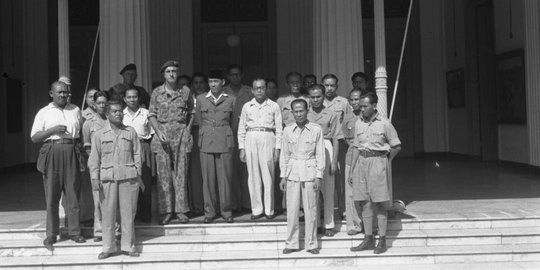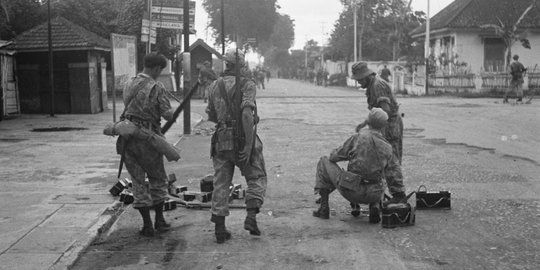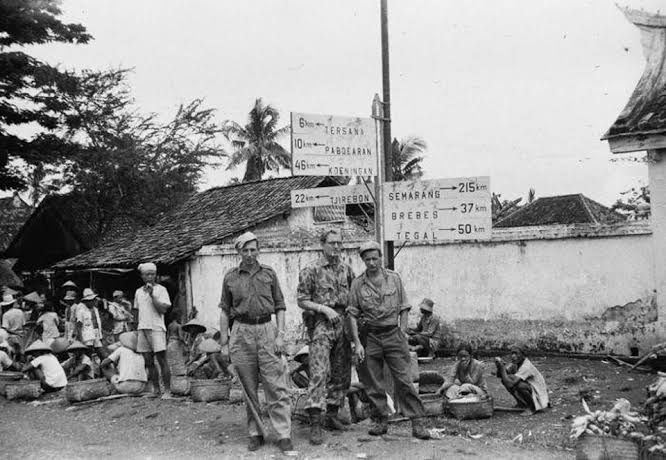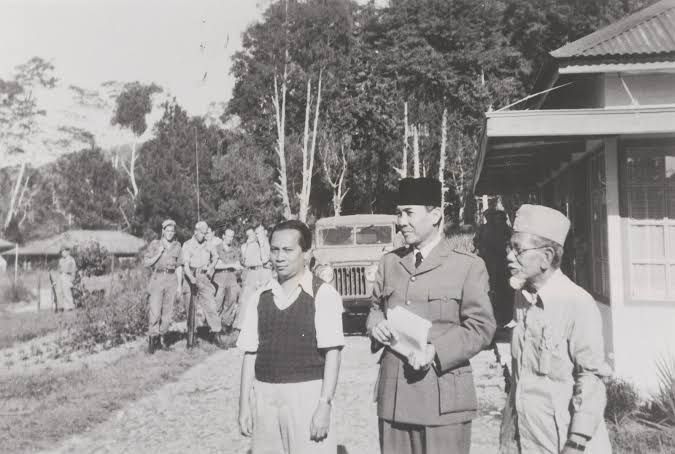
A feeling of uncertainty filled the heart of Second Lieutenant Sukotjo Tjokroatmodjo when he looked up at the Yogyakarta sky that morning. Just above Fort Vredenburg Fort several Dutch bombers were seen hovering low. Occasionally they fired at certain parts of the State Palace. After the gunfire died down and the bomb exploded, the member of Company II Battalion B Mobil of the Military Police Corps (CPM) saw the parachutes of the Dutch military airborne troops hovering above Maguwo.
"I then ran into the Palace and told my friends that the Dutch had attacked," he recalls.

Coordination was fast. President Sukarno's bodyguards were on standby with their respective weapons. They were preparing to face the arrival of the Dutch military. Only when it was dusk did an army of Dutch airborne soldiers arrive. They immediately removed the State Palace and made the Post Office yard their command center. There was a very fierce shootout.
"It must be admitted, at that time our strength was far behind the opposing forces," said Sukotjo.
Having a bad feeling, Sukotjo then suggested that Second Lieutenant Susetio's troops save President Sukarno and his staff through the back door. He himself will lead 30 CPM soldiers to block the Dutch military invasion to the last drop of blood.
But Susetio himself was not the top decision maker. He then invited Sukotjo to appear before Major Gandi, who was none other than President Sukarno's personal aide. Instead of receiving instructions, Major Gandi took Sukotjo before President Sukarno, who was having a discussion on the back porch of the State Palace with Haji Agus Salim, Air Commodore Suryadarma and State Secretary Irsan.
"What's the matter, Co?", said Bung Karno.
Sukotjo took a step forward. With a firm position and an enthusiastic attitude, he then presented his plan to President Sukarno: from A to Z. After hearing Sukotjo's proposal, the President was silent for a moment. While looking at Sukotjo, Bung Karno said in a low but firm tone.
"Look, Co, Merah Putih, will not give up (while raising his right hand up), but we must surrender this place to the Dutch (in a flat tone)," said President Sukarno.

As being struck by lightning, Sukotjo was taken aback by the president's words. He then felt his body weak. Still in an upright position, he vented her emotions with his tears slowly rolling down her cheeks. The atmosphere became chaotic.
Unexpectedly by everyone present there, suddenly Sukotjo removed the gun and klewang that was on his waist and dropped them right in front of Sukarno.
"It's been four years of war how come we gave up?!" he said as he walked away without another salute.
History later recorded that the Dutch army captured President Sukarno and his staff and took them to exile in Sumatra. According to Himawan Soetanto, the Dutch considered the arrest process to be the most thrilling part of Operation Crow.

"It was the most dramatic moment of the Indonesian-Dutch dispute," wrote Himawan in his book Yogyakarta, December 19, 1948.
However, the arrest and exile of Sukarno and his staff was coldly welcomed by the Commander-in-Chief of the Dutch Army in Indonesia, General Spoor. Instead of feeling happy, when the Central Java Operations Commander General Meier reported it, Spoor actually greeted him with a shout: "We've lost!"
Spoor seems 'not happy' Sukarno was arrested just like that. In the big scenario in his head, Sukarno had to fight back and was forced to be shot dead. Or at least he went to the forest with the Great Commander Sudirman to lead the guerrilla.
"The move to allow himself to be taken prisoner was a political move that had a good impact on our independence struggle, and it didn't occur to me at all, who was still snotty when it came to politics," recalls Sukotjo.
President Sukarno's bodyguards did not put up any significant resistance in the Dutch military raid on the State Palace. They were later arrested (including Sukotjo). But a few hours later, Sukotjo recklessly escaped from the custody of the KST (Royal Dutch Army Special Forces Corps) soldiers and managed to rejoin with his main army.
"I was shot with a machine gun, but thank God I managed to escape," he recalls.
Sukotjo was later recorded as actively fighting against the Dutch military in the Yogyakarta and surrounding areas. This was done until the transfer of sovereignty was carried out by the Netherlands on December 27, 1949.
** Your post has been upvoted (11.22 %) **
Curation Trail is Open!
Join Trail Here
Delegate more BP for bigger Upvote + Daily BLURT 😉
Delegate BP Here
Upvote
https://blurtblock.herokuapp.com/blurt/upvote
Thank you 🙂 @tomoyan